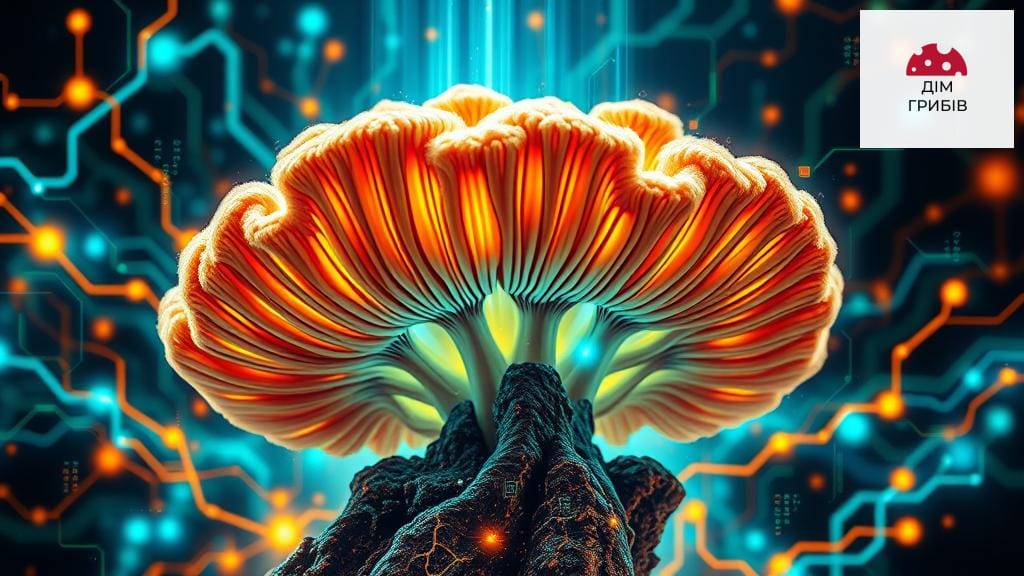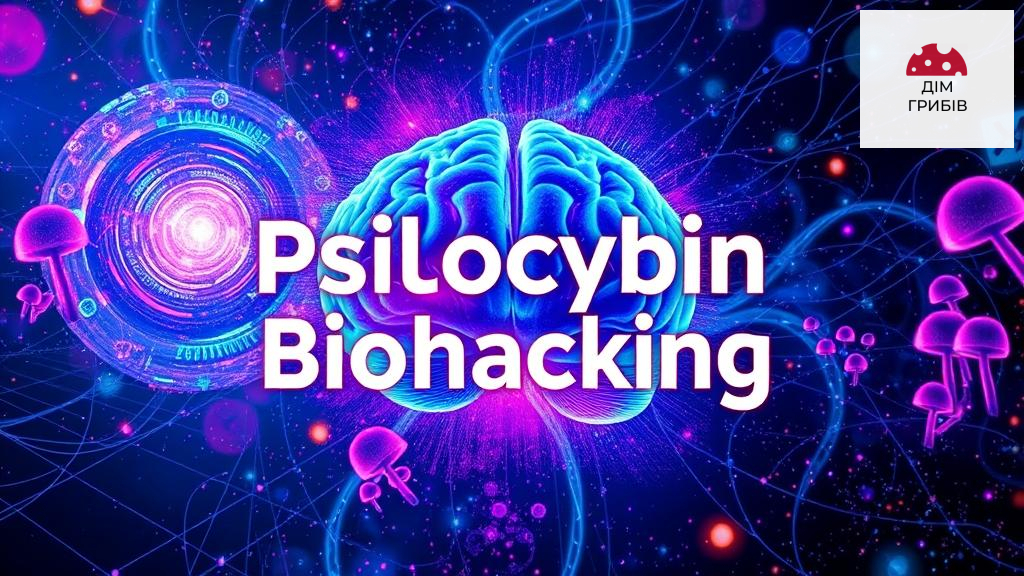Lion's Mane Biohacking: How the Blackthorn Mushroom Turns Your Brain On!

Introduction
Biohacking of the Lion's Mane mushroom opens up new possibilities for modern researchers in studying the effects of natural substances on the brain and cognitive processes. In the modern world, where the speed of information exchange and the intensity of daily tasks are increasing, effective management of brain activity is of paramount importance for maintaining productivity and health. Modern biohacking technologies allow us to reveal the potential of the erinaceus mushroom (Hericium erinaceus), thanks to which it is possible to optimize mental activity, which is actively studied by specialists in the field of neuroscience.
This article will examine in detail the relevance of research into the effects of mushrooms on the brain, the historical and cultural traditions of their use, and modern scientific advances that confirm the effectiveness of biohacking. We will also provide practical advice for those who want to integrate natural ingredients into their daily diet to optimize brain function. If you are interested in related topics, you can read our article on Amanita microdosing and natural remedies for improving cognitive function.
Historical context and traditional use of the Lion's Mane
Biology and history of the fungus
The European hedgehog mushroom, or Hericium erinaceus, has unique biochemical properties that allow it to stimulate neurogenesis, support neuronal regeneration, and improve memory. Historically, it has been used in traditional East Asian medicine, particularly in China, Japan, and Korea, to strengthen the nervous system and improve mental performance.
In ancient times, this mushroom was used not only for medicinal purposes, but also in ritual practices, where it was attributed mystical properties. Here is a brief overview of the main aspects of the use of the mushroom in a historical context:
- Identification: Identifying a fungus by its characteristic appearance.
- Traditional medicine: Used to treat nervous disorders and enhance cognitive processes.
- Ritual practices: A symbol of harmony between body and soul.
Traditional methods of use versus modern approaches
Modern science continues to integrate ancient traditions with modern research methods. Below is a table comparing traditional methods of using Lion's Mane and the modern approach to biohacking:
| Aspect | Traditional use | Modern biohacking |
|---|---|---|
| Application form | Tinctures, boiled decoctions | Extracts, capsules, powders |
| Goal | Improving overall health, longevity | Optimization of cognitive processes, neurogenesis |
| Research base | Empirical observations | Molecular research, clinical trials |
Modern researchers, such as scientists from National Institutes of Health (NIH), confirm that the active components of the mushroom promote the regeneration of nerve cells and stimulate the synthesis of neurotrophic factors, which are critically important for brain health.
Mechanisms of the effect of the fungus on the brain
Neurochemical effects and potential for treating neurological disorders
Biohacking of the Lion's Mane mushroom consists in using its active components to optimize brain function. The molecules contained in the mushroom affect the synthesis of neurotransmitters and improve neural connectivity. Among the main effects are:
- Stimulation of the production of brain-derived neurotrophic factor (BDNF), which helps in the restoration of neurons.
- Increasing brain plasticity, which helps adapt to new information.
- Reducing inflammatory processes, which is important for the prevention of neurodegenerative diseases.
These properties are especially important for people who are experiencing stress or have experienced traumatic events, as natural supplements help to avoid the use of aggressive medications. Modern use of biohacking includes not only the traditional approach, but also innovative technologies for monitoring the body's condition, allowing you to adapt dosage in real time.
Integrating traditional knowledge with modern neuroscience
Integrating traditional knowledge about the Lion's Mane with modern research allows us to expand our understanding of its effects on the body. This symbiosis opens up new possibilities for the development of therapeutic protocols. For example, modern clinical trials demonstrate that the use of extracts of the mushroom can not only improve memory, but also contribute to overall psycho-emotional well-being.
To better understand the main mechanisms of the fungus's influence, we present them in a convenient format:
- Improving neuroplasticity: Helps the brain adapt to new conditions.
- Anti-inflammatory effect: Reduces the risk of developing neurodegenerative processes.
- Regulation of neurotransmitters: Increases the transmission of nerve impulses and improves memory.
These results are supported by studies published in sources such as World Health Organization and modern scientific journals specializing in neuroscience.
Practical tips for implementing biohacking into your daily life
Methods of use and dosage recommendations
The modern approach to biohacking of Lion's Mane you to integrate it into your daily diet through convenient forms such as capsules, extracts or powders. For optimal results, it is important to follow the recommendations of specialists and start with lower doses for gradual adaptation of the body.
Key recommendations include:
- Product shape: Choice of capsules or extracts for ease of use.
- Gradual introduction: Start with a small dose, gradually increasing it as recommended by your doctor.
- Complexity of the approach: Combining biohacking with other natural supplements to strengthen brain function.
For practical use on a daily basis, it is recommended to create a personal regimen that can be adapted to individual needs. Indeed, many users report improved memory, reduced fatigue, and increased concentration thanks to a clear intake regimen.
Additional information on optimal dosing regimens and practical advice can be found in the material Capsule microdosing: secrets of effective use, which details similar approaches in biohacking.
Potential risks and precautions
Despite the many benefits of using natural Lion's Mane extract, it is important to exercise caution. The main risks may include:
- Individual intolerances or allergic reactions
- Failure to comply with recommended doses
- Interaction with other drugs
Preventive measures include regular health monitoring, consulting a doctor when implementing new methods, and using only proven manufacturers of natural supplements. For more information on the safe use of natural ingredients, we recommend reviewing the article Amanita muscaria pills: How natural power activates effective treatment.
It is also important to consider that even natural substances can cause temporary side effects, such as mild dizziness or discomfort in the gastrointestinal tract. After all, each organism is unique, so it is very important to follow the recommendations of specialists and conduct testing before starting treatment.
Modern scientific research and practical cases
Efficacy studies and clinical trials
Recent scientific studies confirm that regular use of extracts of the Lion's Mane helps to improve cognitive functions. Practical cases using biohacking demonstrate positive changes in memory and concentration even in the elderly. For example, clinical trials conducted in Europe have shown that:
- Improving the learning process for students and professionals
- Increased neural network activity in older adults
- Reducing stress levels and increasing overall energy levels
For a more detailed look at the latest trends in neuroscience, we recommend viewing the Innovations in Neuroscience article on our website.
Comparison of the effects of traditional methods and biohacking
To better understand the benefits of modern biohacking, here is a list of the main differences between the traditional use of mushrooms and their modern methods:
- Source of knowledge: Traditional medicine is based on empirical observations, while modern biohacking is supported by molecular research.
- Submission method: Modern supplements have a standardized concentration of active ingredients, which provides a predictable effect.
- Individual approach: Thanks to monitoring technologies, modern methods allow you to adapt the dosage to the specific needs of each person.
A number of studies have found that biohacking with Yarrow can be an effective alternative or complement to traditional drug approaches, as confirmed by data from leading scientific institutions.
Conclusions and development prospects
Main results
If you need a hedgehog to biohack your brain, then contact a specialized store.House of Mushrooms". There you will find dried mushrooms and also mushrooms in capsules and pods, there is still ointments and tinctures from mushrooms, and various medicinal teas
Biohacking of the Scalloped Echinoderm demonstrates high potential as a natural remedy for improving cognitive functions, stimulating neurogenesis and neuronal regeneration. The article examined in detail the history, traditional biology and modern mechanism of action of the mushroom, which opens up possibilities for its effective use in optimizing brain function.
The active components of the mushroom promote the synthesis of neurotrophic factor, improve neural connectivity and reduce inflammatory processes, which is important for the prevention of neurodegenerative diseases. Practical dosage recommendations and precautions help to confidently integrate biohacking into everyday life, while leaving room for an individual approach and adaptation to the needs of the body.
Research prospects and practical applications
Modern technologies allow for a deeper investigation of the molecular mechanisms of the effect of Lion's Mane on the brain, which contributes to the development of new therapeutic strategies. It is expected that in the near future, biohacking of the mushroom will become the basis for a wide range of natural preparations that will help support cognitive function and overall health.
An innovative approach to combining traditional medicine and modern scientific achievements opens up new horizons for researchers. The unique symbiosis of traditional use of the mushroom and modern technologies allows the development of standardized products that can be recommended as a means of supporting cognitive functions. For those interested in further research in this area, we recommend paying attention to the material The Future of Neurohacking, which analyzes in detail promising areas of research and the use of natural supplements in modern medicine.
With the right approach and following the recommendations of doctors, Lion's Mane biohacking can become an effective tool both in prevention and in maintaining a high quality of life in today's fast-paced world.


